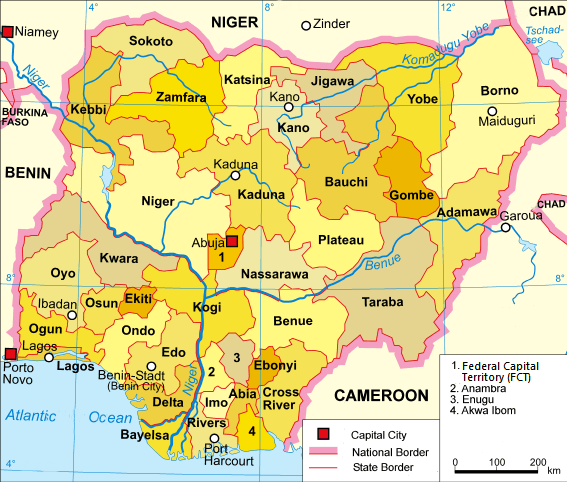2012 Nigeria floods
The 2012 Nigeria floods began in early July 2012, killed 363 people and displaced over 2.1 million people as of 5 November 2012. According to the National Emergency Management Agency (NEMA), 30 of Nigeria's 36 states were affected by the floods. The floods were termed as the worst in 40 years,[3] and affected an estimated total of seven million people.[4] The estimated damages and losses caused by the floods were N2.6 trillion.[5]
 Nigeria | |
| Date | July – October 2012 |
|---|---|
| Location | Adamawa, Taraba, Plateau, and Benue States were worst affected. |
| Deaths | 363 people killed, over 2,100,000 displaced.[1][2] |
Causes
Nigeria has a rainy season and suffers from seasonal flash floods. They are sometimes lethal, especially in the rural areas and overcrowded slums, where drainage is poor or does not exist at all.[6]
July
On 2 July 2012, many Nigerian coastal and inland cities experienced heavy rains, and residents of Lagos were "gasping for breath" due to the flooding. In addition, there was gridlock on major roads, causing people to cancel or postpone appointments they may have had. Thousands of stranded commuters had to pay increased fares for the few bus drivers who were willing to risk travelling on the roads, and construction of work by the Nigerian government on the inner Oke-Afa Road took a "heavy toll."[7]
In mid-July 2012, flooding in the Ibadan metropolis caused some residents at Challenge, Oke-Ayo, and Eleyele to flee from their residences and save their lives. The flooding also prevented some Christians from attending churches in the morning, while a few bridges caved in. The Nigerian government said that certain structures on waterways had to be demolished as a result of the flooding, while Commissioner for Information and Orientation, Bosun Oladele, announced that there weren't any casualties from the flooding.[8]
In late July 2012, at least 39 people were killed due to flooding in the central Nigerian Plateau State. Heavy rainfall caused the Lamingo dam to overflow near Jos, sweeping across a number of neighbourhoods in Jos, and approximately 200 homes were submerged or destroyed. In addition, at least 35 people were missing, while Manasie Phampe, the head of the Red Cross in the state, announced that relief efforts were ongoing. The floods left 3,000 people homeless, many of whom are taking refuge in government buildings in Jos.[9]
August
In mid-August, flooding killed at least 33 people in Plateau State, and co-ordinator of the National Emergency Management Agency in central Nigeria Abdussalam Muhammad said that homes were destroyed while roads and bridges were washed away, obstructing relief efforts. Over 12,000 people were affected by the flooding in six districts of the state, while hundreds were rendered homeless.[10]
September
Release of water from the Lagdo Reservoir in Cameroon caused the deaths of 30 people in Benue State.[11]
October
In early-October, the floods spread to Delta State and Bayelsa State and rendered about 120,000 people homeless, according to state authorities and the Nigerian Red Cross.[3] Several temporary displacement sites set up were also flooded forcing people to flee. In Yenagoa, 3,000 people were sleeping at the Ovom State Sports Complex.[3] In Delta State, among the buildings destroyed by the floods were 20 health clinics, five hospitals, many schools, churches and government buildings. Schools were either closed or occupied by internally displaced persons.[3] The floods also spread across Benue State where a local river overflowed causing the displacement of over 25,000 people.[12]
On 9 October, Nigerian President Goodluck Jonathan released 17.6 billion naira (US$111 million) to various states and agencies for damage response, flood relief and rehabilitation.[3]
Kogi State was the worst affected with 623,900 people being displaced and 152,575 hectares of farmland destroyed, according to a NEMA coordinator. Jonathan called the floods "a national disaster".[13]
See also
References
- "Nigeria floods kill 363 people, displace 2.1 mln". Reuters. November 5, 2012. Retrieved November 26, 2012.
- "Thirty dead in Nigeria flood, 120,000 displaced". AFP. September 9, 2012. Archived from the original on 10 September 2012. Retrieved September 9, 2012.
- "NIGERIA: Worst flooding in decades". IRIN Africa. October 10, 2012. Retrieved May 27, 2015.
- "Nigeria floods test government's disaster plans". The Guardian. Retrieved May 27, 2015.
- "2012 flood disaster cost Nigeria N2.6tn –NEMA". punchng.com. Archived from the original on May 27, 2015. Retrieved May 27, 2015.
- "Nigeria floods kill 137, displace thousands". Reuters. September 9, 2012. Retrieved September 9, 2012.
- Inyama, Nnamdi; Muanya, Chukwuma; Adepetun, Adeyemi (July 3, 2012). "Lagosians gasp for breath as flood ravages the city". The Guardian Nigeria. Retrieved September 9, 2012.
- Ajayi, Ola (July 16, 2012). "Nigeria: Flood Sacks Ibadan Residents". AllAfrica. Retrieved September 9, 2012.
- "Nigeria: Deadly flooding in Jos in Plateau state". BBC. July 24, 2012. Retrieved September 9, 2012.
- "Nigeria Plateau state floods kill 33". BBC. August 14, 2012. Retrieved September 9, 2012.
- "Flooding in Nigeria". NASA Earth Observatory. September 12, 2012. Retrieved May 27, 2015.
- "Nigeria floods kill dozens, wash hippos and crocodiles into homes". CNN. October 5, 2012. Retrieved May 27, 2015.
- "Nigeria flooding called 'natural disaster'". Al Jazeera. October 12, 2012. Retrieved May 27, 2015.